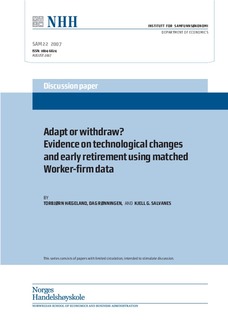Adapt or withdraw? :evidence on technological changes and early retirement using matched worker-firm data
Working paper
Permanent lenke
http://hdl.handle.net/11250/163114Utgivelsesdato
2007-08Metadata
Vis full innførselSamlinger
- Discussion papers (SAM) [657]
Sammendrag
Older workers typically possess older vintages of skills than younger workers, and they may
suffer more from technological change. Experienced workers never the less have accumulated
human capital that make them suitable for adopting new technologies. On the other hand, to
adjust to new technology, workers must invest in training and this may not be worthwhile for
the oldest workers. We exploit the approach by Bartel and Sicherman (1993) to identify this
effect by estimating the retirement response to technological change dependent on how often it
occurs. If technological change occurs often, workers continuously invest in on-the-job training
which may isolate them from the negative effect of technological change. We examine two
hypotheses about the effects of technological changes on early retirement measured for workers
from the age of 50 to mandatory age of retirement at 67. First, we examine whether workers in
firms with higher rates of anticipated technological change retire later than workers in firms
with lower rates of technological change. Second, we examine if (unanticipated) technological
change are positively correlated with earlier retirement. We use a matched employer-employee
data set with a rich set of controls for worker, firm and local labour market characteristics, and
firm level measures of anticipated and not-anticipated technological change. We find a negative
correlation between early retirement and anticipated technological change only for the oldest
male workers (62 to 66). Further, we find a higher probability of transition to retirement for workers above 60 for firms introducing new process technologies.
Utgiver
Norwegian School of Economics and Business Administration. Department of EconomicsSerie
Discussion paper2007:22
